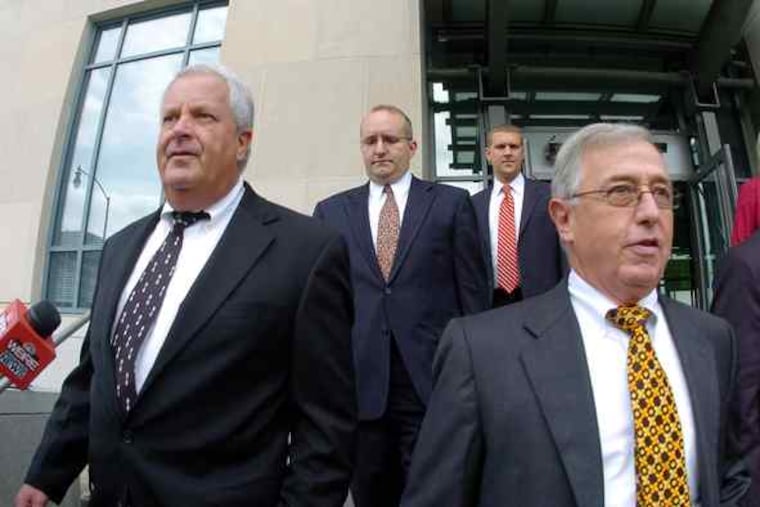Pa. lawmakers should use handling of ‘Kids for Cash’ scandal as a model for Glen Mills | Opinion
Similarities between the Glen Mills and “Kids for Cash” scandals demonstrate the need for an interbranch commission to investigate Glen Mills now.

Each new revelation about the abuse of children at the Glen Mills facility in Delaware County reminds me of another juvenile justice scandal that rocked Pennsylvania almost exactly 10 years ago — the Luzerne County “Kids for Cash” scandal. “Kids for Cash” shocked the Commonwealth for its brazen display of judicial greed and corruption at the expense of children’s constitutional rights.
As one of the lawyers who successfully redressed what happened to the children of Luzerne County, I urge Pennsylvania’s state and county leaders to consider Pennsylvania’s response to the “Kids for Cash” scandal as a guidepost for going forward. (In that case, two Luzerne County judges were imprisoned in a kickback scheme involving for-profit juvenile-detention centers.)
In addition to litigation initiated on behalf of the children, Pennsylvania established the Interbranch Commission on Juvenile Justice to investigate after the federal criminal prosecution against then-Judges Mark A. Ciavarella Jr. and Michael T. Conahan was disclosed in January 2009. Chaired by then-Superior Court Judge John M. Cleland, the commission was comprised of 11 individuals, each of whom was appointed by one of the three branches of state government, and included representatives from the judicial branch, victim advocate’s office, prosecutor and public defender services, and other state agencies.
Over a period of about 10 months in 2009, the commission heard from 70 witnesses, including experts from outside Pennsylvania, to gain an understanding of how a court system designed to serve and protect our children could be pulled so far off its mark. The testimony revealed how this court was perverted from an instrument of rehabilitation into a tool of repression of children’s most fundamental constitutional rights as well as a conduit for lining the pockets of two judges with nearly $3M of illegal income. Testimony also revealed other systemic lapses, including weak oversight by state and local agencies, tacit acceptance of day-to-day violations of children’s rights by public defenders and prosecutors, and an overall willingness to simply look the other way.
Similarities between the Glen Mills and “Kids for Cash” scandals demonstrate the need for a similar investigative body now. In both instances, the misconduct thrived on ignorance and intimidation. In a courtroom closed to the public to protect children’s confidentiality, the Luzerne County judges’ daily violations of the children’s rights to counsel and other due process protections escaped scrutiny. Parents and children alike were kept in the dark — not only about the exchange of millions of illicit dollars but through the court’s failure to advise them of the very rights they were being denied. And those who bore witness to the constitutional abuses — prosecutors, public defenders, and other court officials who saw but failed to act — remained silent, and complicit, to protect their own livelihood. Weak judicial and executive branch oversight likewise failed the children of Luzerne County.
Similarly at Glen Mills, Lisa Gartner’s reporting indicates counseling and other staff at Glen Mills routinely stood by while children were beaten and abused. They saw but did not speak. And the pressure to stand silent in service of one’s own financial well-being has played out at Glen Mills as well, as the reporting reveals a pattern of Glen Mills employees repeatedly yielding to demands to protect the violent culture that lies at the heart of the Glen Mills’ “program.” The abysmal failure of local and state children and youth agencies to scrutinize the Glen Mills program despite the filing of many incident reports of abuse over the years, as well as the persistent rumors of a “fight club” culture there, is simply inexcusable.
The final report of the Luzerne County Interbranch Commission contained dozens of recommendations to prevent similar abuses in the future. Many led to concrete reforms, from revamping judicial ethics procedures to enhanced training curricula for prosecutors to a legislative package that, among other things, barred children’s waiver of counsel, expanded children’s appeal rights, tightened procedures for removing children from their homes, and broadened expungement of juvenile court records.
Ten years after the “Kids for Cash” scandal, Pennsylvania is once again the subject of national headlines about its scandalous juvenile justice system. A robust and transparent state-level investigation of “Kids for Cash” allowed Pennsylvania to emerge from that scandal with a reform package that positioned it to once again serve as a leader in juvenile justice reform. Then as now, the state must lead the way. The state’s legislative, executive. and judicial branches must come together to protect our children.
Marsha Levick is the chief legal officer at Juvenile Law Center.